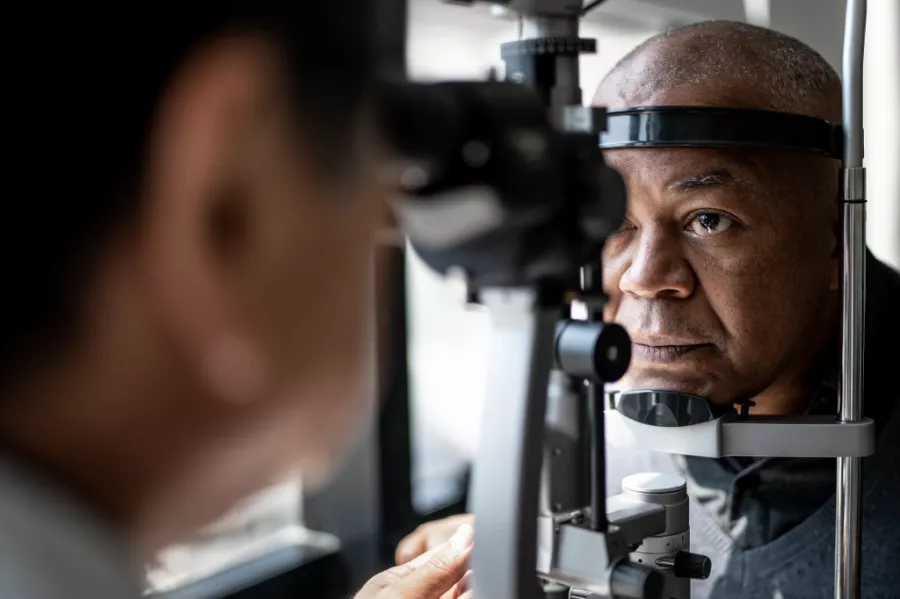
Glaucoma is one of the most common causes of blindness, and refers to a group of eye diseases that can result in vision loss due to damage to the optic nerve. Although you can't reverse damage to the optic nerve—the bundle of fibers that send visual messages to your brain—glaucoma can be successfully treated when caught early during an annual eye screening. Dr. Werner highlights 6 things to know about protecting your vision from this serious disease.
- Glaucoma has no symptoms until it's advanced. Catching glaucoma early is critical because there are no signs or symptoms until after the optic nerve is damaged. In glaucoma, elevated eye pressure damages the optic nerve, which connects the eye to the brain. There are two types of glaucoma: open-angle glaucoma and angle-closure or closed-angle glaucoma. In open-angle glaucoma—the most common type in the U.S.—there is outflow obstruction within the eye's drainage system causing a backup of fluid and elevated pressure. In closed-angle glaucoma, there is a blockage in front of the eye's drainage system leading to elevated eye pressure. There is a variant of angle closure, called Acute Angle Closure, in which the iris completely blocks the drainage system, and causes a rapid and dramatic rise in eye pressure. This is a medical emergency, and you should call your ophthalmologist or go to the emergency room immediately because your vision is at risk.
Symptoms of an Acute Angle-Closure Crisis include the following:- Intense eye pain
- Nausea/vomiting
- Red eyes
- Blurry vision
- Headache
- Halos or colored rings around lights
- Glaucoma is a leading cause of blindness in people over 60. Glaucoma is one of the leading causes of blindness in people over 60, along with age-related macular degeneration, cataracts and diabetic retinopathy. According to the American Optometric Association, once you turn 60, eye diseases can develop that can change your vision permanently. Glaucoma is a particularly stealth disease because it causes no symptoms or pain. It's often called a "silent thief of sight" because it can harm the optic nerve before there is any vision loss. Glaucoma usually affects peripheral vision first and often affects both eyes. Generally, people with glaucoma first lose their peripheral vision and may lose their central vision, which is used for seeing fine detail and reading, later in the disease process.
- Some people are at a higher risk for glaucoma. You should know your glaucoma risk and make sure to get your eyes checked as often as your eye doctor recommends. Those at a higher risk include people who:
- Are over 60
- Have high eye pressure
- Are farsighted or nearsighted
- Have had eye surgery
Use long-term steroid medications - Have corneas that are thin in the center
- Have a thinning optic nerve
- Have chronic health conditions such as migraines, diabetes, high blood pressure, poor blood circulation or other conditions that affect the whole body
- Have a family history of glaucoma
- Are Black, Hispanic or Asian
According to the Centers for Disease Control and Prevention, "Black people are 6 to 8 times more likely to get glaucoma than white people," and "people with diabetes are 2 times more likely to get glaucoma than people without diabetes." Knowing your risk level and talking to your doctor are 2 of the best prevention methods against glaucoma.
- An annual eye exam is the only way to catch glaucoma. Annual eye exams, especially for people at higher risk for developing glaucoma, are crucial for detecting eye diseases early and preventing or slowing symptoms. Glaucoma is no different. There are no symptoms in the early stages of glaucoma and, therefore, no way to know if damage is being done to the optic nerve. A dilated eye exam given by an eye doctor is the best way to find out if you have glaucoma or are at risk for developing it. If caught early, there are treatments that can manage symptoms and prevent blindness. While it's not possible to reverse damage to the optic nerve once it has occurred, if the disease is caught early, the disease progression can be slowed or halted and vision can be saved.
- Glaucoma symptoms can be hard to detect. Again, because there are few symptoms of glaucoma until it is advanced, many people are unaware that they have it. One sign of glaucoma is losing peripheral vision over time, which happens with open-angle glaucoma, but it occurs so slowly that it may be hard to notice. As the optic nerve becomes damaged, people may notice blind spots in their vision. At advanced stages of glaucoma, patients may lose all vision in the eye, including the ability to see light and dark.
- There are many treatments available for glaucoma. Early treatment is the best way to save your vision and prevent disease progression. Without treatment, glaucoma can lead to permanent blindness. "Glaucoma is a chronic disease that requires lifelong monitoring and treatment, and there are many options to treat the disease," said Dr. Werner. "Your doctor may recommend treatments like eye drops, medication, laser therapies, minimally invasive glaucoma procedures and glaucoma surgery. These treatments reduce eye pressure and can prevent or slow permanent vision loss."
